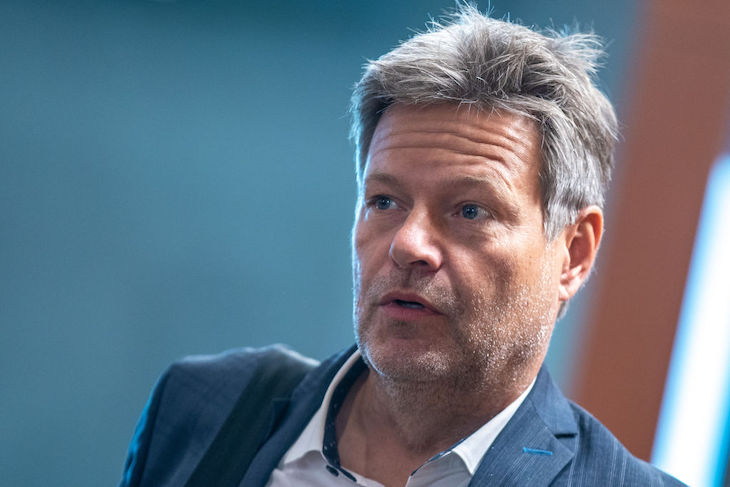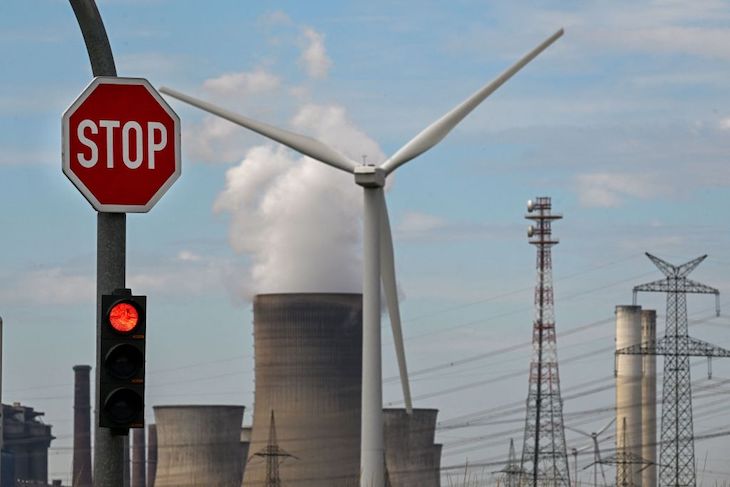Germany’s Robert Habeck might well be an excellent children’s book author but he is proving to be a dismal economy and climate minister. Habeck, who also serves as the Greens vice-chancellor in the country’s coalition government, rode to power in 2021 promising to speed up the transition to renewables. At the heart of his pledge: more windmills, bigger windmills and, above all, built much, much faster. But these promises are proving to be little more than hot air, as my own fruitless struggle to build windmills attests.
Wind energy is crucial if Germany is to meet its goal of renewables producing 80 per cent of electricity by 2030, up from 46 per cent last year. Chancellor Olaf Scholz says that ‘four or five windmills’ must enter service daily between now and 2030. The University of Cologne’s Energy Economy Institute says six windmills must be built each day to meet the target. But in the first half of 2023, an average of just 1.8 new windmills were built each day. Failure to speed up the excruciating approvals and permitting process for renewables is the main reason for the hold up. ‘Nothing here is going any faster yet in Germany,’ said a wind energy developer in Berlin, who asked not to be named.
Germany is losing the ability to carry out big, bold projects
To make matters worse for European builders of wind turbines, rising interest rates, supply bottlenecks for manufacturers and financial woes are also biting. As wind turbine construction slumps in Germany, the amount of electricity produced by windmills has flatlined since 2019. From 2014 to 2017, as many as 1,792 new onshore windmills were built each year. Since 2019, the figure has been less than 500 wind turbines for all but one year, according to the German Wind Energy Association.
The truth is that the number of windmills being built will be nowhere near the numbers needed to meet Habeck’s targets. Slow manufacturing isn’t the only reason: there is also rising anger among Germans who say wind turbines defile the countryside and fight them tooth and nail.
Amid this and other missteps on migration and the economy, support for the Schlolz-Habeck government fell to a record low. Just a fifth of voters said they were satisfied with the coalition’s work, according to a poll for ARD TV.
Habeck isn’t the only politician to land himself in hot water for making promises which he can’t deliver. Too many politicians in Berlin are guilty of making grand statements of ambition while ignoring pesky questions about how practical these schemes are. The dismal failure to meet Nato defence spending targets is a prime example. Politicians in Berlin also like virtue-signalling on being morally clean and speaking of how Germany must be an example for the world. Whether anybody abroad is even watching is a question never asked.
Perhaps most worryingly, for a country that prides itself on efficiency, an obsession with bureaucratic process over almost everything has taken hold in Germany. Slashing the red tape, while much discussed, is rarely done in practice.

Jan Techau, director of Europe at the Eurasia Group, a political consultancy, warns that Germany is losing the ability to carry out big, bold projects. ‘This is sophisticated state failure,’ says Techau. A cancer where everything still seems to work ‘yet nothing gets done.’ Berlin’s Tagesspiegel newspaper says Germans now have ‘Angst’ about any big project. ‘First of all, the blanket answer is often: no.’
Windmills bitterly divide the Greens
The failure to speed up renewables comes despite a growing list of reasons for supercharging their expansion. Environmental concerns are part of this necessity; so, too, is the simple matter of geopolitics: Russia’s war on Ukraine ended cheap natural gas imports from Moscow.
After the last three of Germany’s fleet of nuclear power plants were closed this year, there have also been issues related to generating electricity. Germany’s 17 shuttered nuclear stations used to supply a quarter of the nation’s electricity. Nevertheless, closing them was a sacred cow for Greens. So, surprise, surprise: Germany went from being a net exporter of electricity in the first quarter of 2023, to net electricity importer in the second quarter, after the three nuclear plants were shut in April, according to the Federal Statistics Office. Most imported electricity now comes from, you guessed it, nuclear power plants in France.
The hasty departure from nuclear has also forced the reopening of closed blocks at the filthy brown coal power plant in Jänschwalde, in eastern Brandenburg state, to make up for possible power shortfalls. Jänschwalde is a few miles from where I live and has been going gangbusters all summer with huge clouds belching from its cooling towers.
Which brings us back to Greens minister Habeck. Despite his failure to speed up renewables; despite German industry and consumers suffering from some of the highest electricity costs in the world to subsidise wind and solar; despite the economy sliding into recession; and despite German companies moving new investments abroad, nothing slows Habeck’s come hell-or-high water ambition to win Germany’s race to the Holy Grail of renewables: net zero. It’s as if Habeck has forgotten half of his job title – ‘Federal Minister for Economy’ – to focus solely on the second half: ‘and Climate Protection.’
German polls show big majorities love renewables. Just not in my backyard, please
Habeck’s mantra remains: ‘Onshore wind energy is the key for our energy supply’ and he still claims he can expand the number of wind turbines to cover two per cent of German territory with windmills to enable Europe’s biggest economy to be carbon neutral by 2045. Good luck with that.
The least of Habeck’s problems is his own party. But this is bad enough. Windmills bitterly divide the Greens between those demanding radical expansion of windmills to cut CO2; Nimbys who love renewables but not in hip, weekend house regions like the Uckermark near Berlin; and those demanding total nature protection and de-growth.
The Greens, a big-city party with few members in rural areas, are brutal in dealing with those viewed as enemies, such as farmers, hunters and almost any land-user. This ‘take no prisoners approach’ won’t work for wind energy, however, because it could tear the green movement apart.
Yet the trouble is that Habeck’s renewables plan will fail unless he uses the most robust, legal force of the federal government to slash regulation, water-down nature protection regulations and axe laws designed to prevent wind turbines and hundreds of miles of power lines needed for a renewables-based grid. Or, if he has to leave the regulatory jungle in place, triple the number of bureaucrats to speed things up.
If he is too succeed, Habeck needs to legally castrate regional and municipal governments to strip them of the power to decide the fate of wind parks. So far, he has tinkered at the edges of this but not gone for the kill. This won’t work: Germany needs to further reduce the ability of legal proceedings to block or slow renewables and power-line projects.
In thinly-populated eastern Germany, four out of five states banned building windmills in forests. My state, Brandenburg, was the only exception that allows them. This removed a huge area of potential wind energy sites. The ban on forest windmills may have been declared null and void in Thuringia state by the Federal Constitutional Court in 2022, but the four states are in no hurry to amend their laws. Saxony-Anhalt says it plans to eliminate the old law by 2024, yet there’s speculation it’ll be only slightly altered. This could limit windmills to a small number of forests damaged by fire, bark beetles or wind.
At our family forestry business, I’ve seen for myself the obstacles in trying to build wind turbines on six different sites in eastern Germany. As I’ve discovered, even where it seems possible to build a wind park, nothing is decided until everything is decided. And sometimes, nobody can even tell you if everything has been decided.

At Kleinsee Forest, about two hours southeast of Berlin, I signed a contract to be part of a wind park in January 2021. The first step was a year-long environmental impact report. Before this, nothing can be done. The study costs hundreds of thousands of euros and involves people running around in the woods day and night counting birds, bats and everything else that creeps, crawls or flies. On the hottest summer days, a guy who looked like a San Diego surf bro, perched on a lifting platform 20 metres above a meadow from dawn to dusk, noting down whatever he saw in the sky.
The most important finding was a nest used by a peregrine falcon. The peregrine falcon is no longer endangered and the population in Germany and Europe has risen since the 1970s. There are 600 breeding pairs in Germany and up to 15,000 pairs in Europe. Nevertheless, windmills generally can’t be built closer than 500 to 1,000 metres from raptor nests. For this wind park, the nest means that at least one of the potential windmills has been axed. But last year, the falcon moved 750 metres east and laid its eggs on the roof of a hunting high seat. Did this mean we could build the wind mill near the old nest? Of course not. The site is ‘reserved’ for at least three years in case the falcon decides to return.
Transpose this across Germany and it means many windmills blocked due to birds that aren’t threatened or not even present. Smart technology may be a better answer than bans: early warning systems can shut down windmills when larger birds approach. It’s already standard practice that windmills in areas with bats don’t operate at dawn and dusk when bats are most active.
A query to the local government met with a flat ‘nein!’ The developer dropped the project
The municipal government has now voted three times in favour of my project. Is it now green-lighted? Certainly not. Approval is not just required from numerous other higher-up state bodies. It may still need to go back to the municipal government for yet another vote. When I asked the developer when the final go ahead can be expected, he shrugged his shoulders and said: ‘Maybe in 2025.’
So, if all goes well, the first wind turbines may start producing electricity in 2027. That’s almost seven years after I signed the contract. And this is for a small wind park with just 15 windmills.
Our second wind park suffered a fate illustrating the small-town German municipal power to torpedo renewables. It was planned west of the city of Eisenhüttenstadt and our part of the park was to have had four wind turbines. The developer was optimistic environmental issues could be sorted. But a query to the local government met with a flat ‘nein!’ The developer dropped the project.
A third windmill was supposed to be built near Kyritz in western Brandenburg. The project seemed set to go but there was a problem: there are already a dozen wind turbines in the area. The developer bailed out after discovering the local government wouldn’t approve more.
So even on the tiny portion of Germany where windmills are, in theory, allowed, there are umpteen reasons not to build them – or build less of them.
German polls show big majorities love renewables. Just not in my backyard, please. Not in our sacred forests. Not near our weekend cottages. And don’t you dare water down our local rights to say ‘no’ to anything we don’t like.
The next time you hear leaders from Berlin virtue-signalling on how swiftly they will be expanding wind energy, ask minister Habeck: where’s the beef (or, in his case, the veggie-burger)? This government, despite the best of intentions, is not going to deliver on its renewable energy targets.






Comments